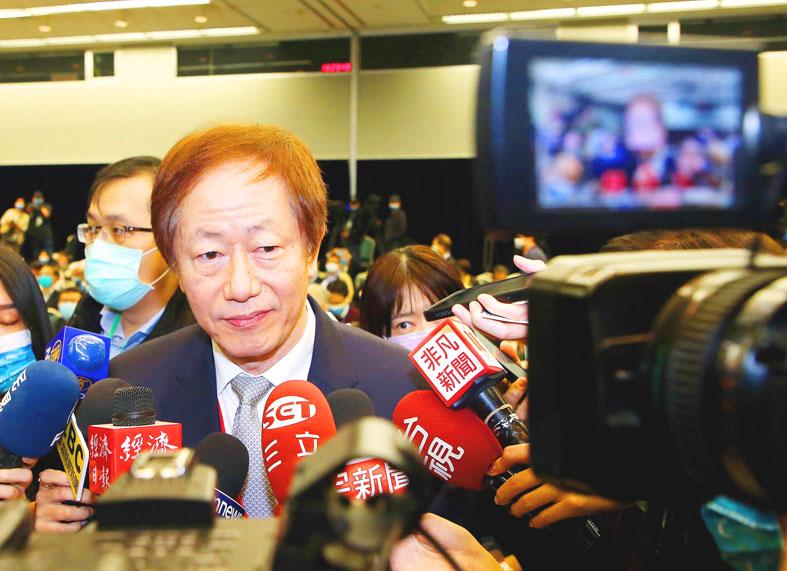There are probably not many people who believe that Taiwan is unstable because of geopolitical factors, Taiwan Semiconductor Manufacturing Co (TSMC, 台積電) chairman Mark Liu (劉德音) said yesterday in Taipei in response to comments by Intel’s top executive.
Intel CEO Pat Gelsinger on Wednesday told the Fortune Brainstorm Tech summit in California that the US government should support a sustainable semiconductor supply chain in the US, in part because “Taiwan is not a stable place.”
With China sending 27 military warplanes into Taiwan’s air defense identification zone on Sunday, Gelsinger asked: Does that “make you more comfortable or less if you’re now dependent on Taiwan as the singular source of technology for the most critical aspect of our human existence and our national security and economy for the future?”

Photo: CNA
BEST COMBINATION
Asked about the comment, Liu said: “There’s nothing that needs to be addressed.”
“TSMC does not speak ill of other companies in the industry,” Liu said, adding that there were probably not many people who believed Gelsinger’s argument.
Geopolitical tensions might have a short-term impact, but Taiwan could help create a brilliant decade for the global semiconductor industry, with the best technology and the best manufacturing ecosystem, he said.
TSMC’s construction of a plant in Arizona is on schedule and is likely to begin mass production, mainly deploying 5-nanometer technology, during the first quarter of 2024, he said.
The company also plans to begin building a factory in Japan’s Kumamoto Prefecture next year after announcing a partnership with Sony Semiconductor Solutions Corp early last month, he said.
Despite labor shortages that have emerged in Japan, TSMC expects to begin mass production using 22-nanometer and 28-nanometer processes by the end of 2024, Liu said.
GROWING INDUSTRY
Global demand for semiconductors would continue to grow, he said, adding that the production value of the global semiconductor sector would reach US$1 trillion in 2030, creating US$3 trillion to US$4 trillion in value in the electronic products market.

SELL-OFF: Investors expect tariff-driven volatility as the local boarse reopens today, while analysts say government support and solid fundamentals would steady sentiment Local investors are bracing for a sharp market downturn today as the nation’s financial markets resume trading following a two-day closure for national holidays before the weekend, with sentiment rattled by US President Donald Trump’s sweeping tariff announcement. Trump’s unveiling of new “reciprocal tariffs” on Wednesday triggered a sell-off in global markets, with the FTSE Taiwan Index Futures — a benchmark for Taiwanese equities traded in Singapore — tumbling 9.2 percent over the past two sessions. Meanwhile, the American depositary receipts (ADRs) of Taiwan Semiconductor Manufacturing Co (TSMC, 台積電), the most heavily weighted stock on the TAIEX, plunged 13.8 percent in

A wave of stop-loss selling and panic selling hit Taiwan's stock market at its opening today, with the weighted index plunging 2,086 points — a drop of more than 9.7 percent — marking the largest intraday point and percentage loss on record. The index bottomed out at 19,212.02, while futures were locked limit-down, with more than 1,000 stocks hitting their daily drop limit. Three heavyweight stocks — Taiwan Semiconductor Manufacturing Co (TSMC, 台積電), Hon Hai Precision Industry Co (Foxconn, 鴻海精密) and MediaTek (聯發科) — hit their limit-down prices as soon as the market opened, falling to NT$848 (US$25.54), NT$138.5 and NT$1,295 respectively. TSMC's

ASML Holding NV, the sole producer of the most advanced machines used in semiconductor manufacturing, said geopolitical tensions are harming innovation a day after US President Donald Trump levied massive tariffs that promise to disrupt trade flows across the entire world. “Our industry has been built basically on the ability of people to work together, to innovate together,” ASML chief executive officer Christophe Fouquet said in a recorded message at a Thursday industry event in the Netherlands. Export controls and increasing geopolitical tensions challenge that collaboration, he said, without specifically addressing the new US tariffs. Tech executives in the EU, which is

In a small town in Paraguay, a showdown is brewing between traditional producers of yerba mate, a bitter herbal tea popular across South America, and miners of a shinier treasure: gold. A rush for the precious metal is pitting mate growers and indigenous groups against the expanding operations of small-scale miners who, until recently, were their neighbors, not nemeses. “They [the miners] have destroyed everything... The canals, springs, swamps,” said Vidal Britez, president of the Yerba Mate Producers’ Association of the town of Paso Yobai, about 210km east of capital Asuncion. “You can see the pollution from the dead fish.